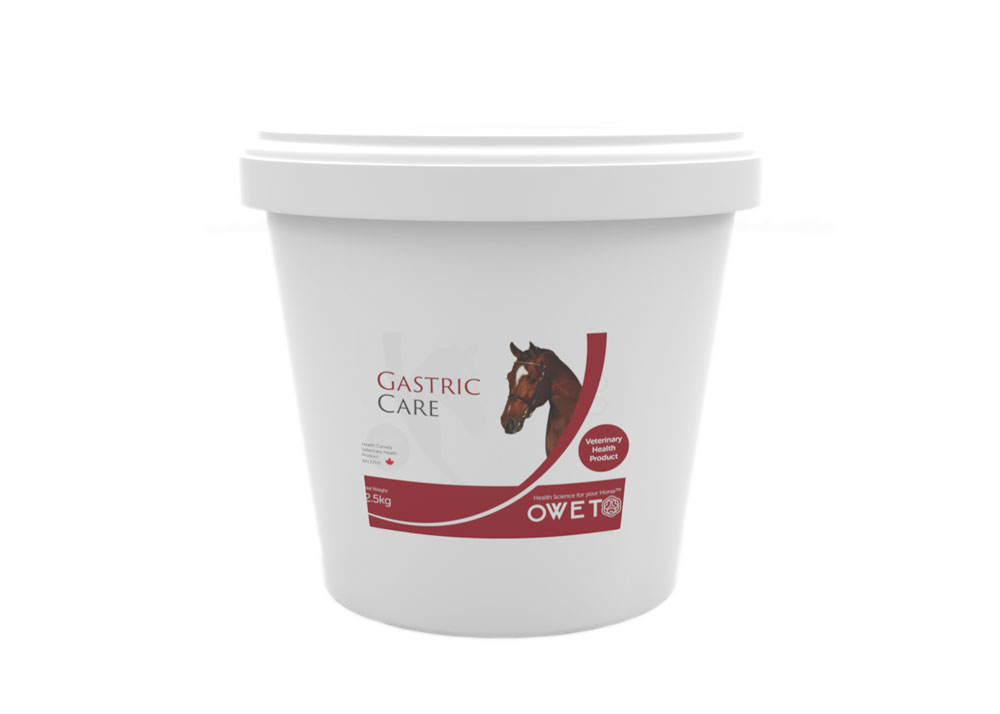
Gastric Care is scientifically formulated with the horse’s gastro-intestinal system in mind. Intestinal health affects every aspect of bodily function, including the brain and the immune system.
The carefully selected and proportioned ingredients in Gastric Care include natural, high quality sources of essential Omega fatty acids, anti-oxidants, prebiotics, vitamins and minerals to support multiple levels of equine digestive and systemic health.
Claims:
• Supports gastric health
• Supports intestinal health
• Supports tissue anti-oxidant activity
• Supports a healthy gastric and intestinal epithelium
• Supports healthy intestinal microbiota
• Supports intestinal digestive
• Supports intestinal and systemic immunity
Health Science for your Horse™
Approved in Canada as a Veterinary Health Product NN.E7H5
ALL Ingredients are GRAS approved for use in animal supplements in the EU and USA
“All disease begins in the gut” – Hippocrates
The gut contains 10x more health supporting and disease fighting bacteria, than the rest of our body combined. Properly functioning digestion & elimination allows the body to properly maintain it’s essential functions & prevent the build-up of autotoxins.
Ingredients & Nutritional Facts
• Ground Golden Flaxseed – ALA (beneficial fatty acid)
• Gluten Free Oat Flour
• Omega-3 rTG, EPA + DHA (from fish oil)
• Proprietary yeast source of nucleotides, peptides and amino acids
• Trehalose
• Sodium bicarbonate
• Proprietary chelated selenium yeast product
• Ganoderma lucidum
• Saccharomyces cerevisiae
All ingredients have regulatory approval.
Crude Protein: 17%
Total Fat: 6%
Crude Fibre: 8%
Ash: 3%
Moisture: 8%
Feeding Instructions & Contraindications
Adult horses: 1 to 3 scoops (1 scoop = 10 g), one to two times daily, orally administered at time of feeding. Recommended use 30 days to infinite, in consultation with veterinarian. Dry feeds should be wetted to minimise the risk of choke..
A feed supplement for horses not intended for food.
Consult your veterinarian if using medication or for general advice.
Do not exceed recommended dose.
Administer during or after the animal has eaten to reduce incidence of gastrointestinal upset.
Do not use in animals with autoimmune disease or bleeding disorders, unless directed by a veterinarian.
Do not use in immature, pregnant or lactating animals.
Not for use in horses intended for food.
Product Size:
2.5kg
Evidence-based Science for Gastric and Intestinal Health
The gastrointestinal (GI) system plays important roles in your horse including
• Defence against ingested pathogens
• Breakdown of feedstuffs
• Absorption of nutrients
• Providing a barrier between GI contents (which are ‘external’ to the horse) and the interior
• Housing commensal or beneficial microbiome
• Direct communication and interactions with the innate immune system
• Communications to and from the brain, and other parts of the body
Can good nutrition prevent LGS from occuring?
The short answer is yes, and maybe.
Stressors and ingested substances that are detrimental to GI health may occur in the presence of great nutrition, such that LGS occurs. These two elements, ingested substances and stressors, also come down to good equine management practices.
The GI system is very important to the horse’s wellbeing, as well as to health and performance. Good nutrition is key to achieving and maintaining a healthy GI system.
Effective stress management is also very important.
Making the Case for Optimising Gastrointestinal Health

There is bi-directional flow of signals between gut and brain and immune system. GI health affects the health of all major organ systems. Optimal GI health is required for optimal performance.
Current estimates place more than 90% of performance horses with gastric ulcers and a similar number having some form of hindgut inflammation or ulcers such as colitis. Collectively, these unhealthy GI conditions result in a range of signs that, when taken together, are now known as equine leaky gut syndrome (LGS). Equine LGS bears many similarities to irritable bowel syndrome, Crohn’s disease, etc. in people. The mechanisms underlying leaky gut in mammals bears similarities across species, and effective treatments are also similar across species.
Ingestion of pathogenic organisms on the ground, on foliage or foliage itself, fence posts and other items can disrupt GI health. The acid environment of the stomach provides some defense against pathogens but many, including harmful bacteria, fungi, plant matter pass through the stomach to make their way down the intestinal tract. Some act as poisons directly on the intestinal epithelial cells (IECs), causing the intestinal barrier to fail in places, causing leakiness. Some act as poisons against beneficial bacteria and fungi in the GI system, resulting in proliferation of harmful bacteria / fungi that produce and secrete poisons. The innate immune system can deal with small numbers of these harmful organisms and compounds, but are overwhelmed when stressors are excessive.

The leaky gut (right picture) allows pathogens to cross the intestinal barrier and infect the intestinal wall, as well as other tissues by transport within the blood. This results in an inflammatory response in the intestine by mounted by the immune system.
Tight junctions between intestinal epithelial cells help maintain healthy gut barrier function, but are damaged by many pathogens.
Stressors include ingestion of pathogenic substances, unaccustomed exercise and activities, high ambient heat and humidity, rough or poor handling, inadequate turn out durations, interactions with other horses or people, transport, noise, vermin, other health ailments (i.e. lameness), as well as medications that are used to treat other health concerns. Bute, for example, is destructive to the GI system and should only be used by veterinary prescription for as short a time as possible.
The keys to a healthy GI system? Good nutrition management and good stress management.
Advanced Gastric Support

